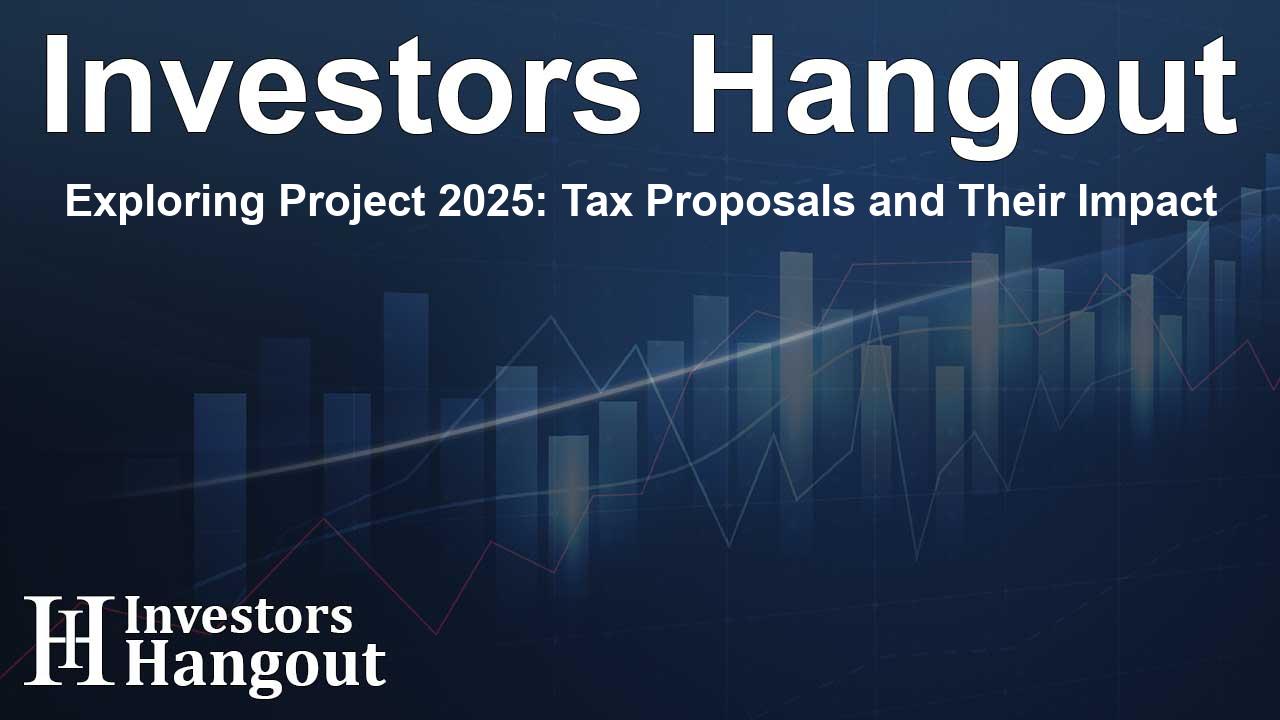Exploring Project 2025: Tax Proposals and Their Impact

Introduction to Project 2025
Project 2025 presents a controversial vision for the future of America that raises various discussions about its implications on freedom and wealth distribution. The plans encompass significant modifications to individual rights and institutions, igniting debates across the nation. Amidst these drastic changes, the tax agenda also requires serious scrutiny.
The Dangers of the Tax Proposals
The tax proposals outlined in Project 2025 aim to drastically alter the current tax system, which could have long-lasting repercussions on the economy. Suggestions like reducing the corporate tax rate to 18%, lowering individual income taxes to 30%, and minimizing taxes on dividends and capital gains to 15% paint a picture of a tax landscape that favors the wealthy. This shift could enhance wealth concentration among billionaires and trillionaires who might evade significant federal taxation.
Concentration of Wealth and Power
Should these proposals be implemented, the balance of power could shift dramatically. A smaller tax burden on the wealthy ensures political influence remains within an elite minority, undermining the democratic processes of the nation. Such concentration may impede opportunities for the middle class and lower-income earners to rebuild their financial standing, ultimately jeopardizing the economic fabric of society.
The Controversial Universal Savings Accounts
While the corporate and individual tax rates grab attention, the concept of Universal Savings Accounts (USA) is another facet of Project 2025 that warrants discussion. Initially appearing as a simple savings tool, USAs could give high-income earners unparalleled opportunities to shelter their wealth from taxation.
Structure of Universal Savings Accounts
USAs allow taxpayers to contribute up to $15,000 of after-tax earnings, functioning like Roth IRAs. However, their design lacks limitations that standard retirement accounts adhere to, enabling significant tax avoidance potential. USAs could empower taxpayers to shield large capital gains – potentially reaching into the billions – from federal taxes. This could create an elite subset of individuals with unregulated monthly income growth.
The Reality of Closely Held Businesses
Project 2025 contemplates allowing USA holders to invest directly into their closely held businesses, a deviation from current Roth IRA regulations. This could pose an immediate risk where nascent businesses could establish themselves with tax-deductible capital, thereby eliminating federal income tax liabilities even as they grow.
Historical Context and Future Implications
Historically, some of the most successful companies emerged from humble beginnings. The founders of these companies could potentially benefit from USAs more substantially than average taxpayers, leading to unprecedented wealth accumulation without a commensurate tax obligation. If figures like future entrepreneurs were to leverage their USAs effectively, the results could mimic the extensive wealth concentration observed during the Gilded Age.
The Bottom Line on Project 2025
In summary, Project 2025 outlines a complex interplay of taxation policy and its broader implications on societal structure and wealth distribution. By allowing wealth concentration among a select few, it threatens to reshape America’s financial landscape.
Frequently Asked Questions
What is Project 2025?
Project 2025 is a proposed agenda that includes significant changes to the American political and economic landscape, notably through its tax reforms.
How could Project 2025 affect taxation?
The proposals could lower tax rates for corporations and high-income earners, which may exacerbate wealth concentration in society.
What are Universal Savings Accounts?
Universal Savings Accounts are a proposed financial instrument that allows taxpayers to shelter substantial amounts of wealth from taxation.
Why are USAs controversial?
USAs could provide a means for wealthy individuals to bypass taxation on significant capital gains, increasing economic disparity.
What can be done to address the concerns with Project 2025?
Increased public awareness and dialogue regarding tax policies, equity, and regulations could help address potential issues stemming from the proposals of Project 2025.
About Investors Hangout
Investors Hangout is a leading online stock forum for financial discussion and learning, offering a wide range of free tools and resources. It draws in traders of all levels, who exchange market knowledge, investigate trading tactics, and keep an eye on industry developments in real time. Featuring financial articles, stock message boards, quotes, charts, company profiles, and live news updates. Through cooperative learning and a wealth of informational resources, it helps users from novices creating their first portfolios to experts honing their techniques. Join Investors Hangout today: https://investorshangout.com/
Disclaimer: The content of this article is solely for general informational purposes only; it does not represent legal, financial, or investment advice. Investors Hangout does not offer financial advice; the author is not a licensed financial advisor. Consult a qualified advisor before making any financial or investment decisions based on this article. The author's interpretation of publicly available data shapes the opinions presented here; as a result, they should not be taken as advice to purchase, sell, or hold any securities mentioned or any other investments. The author does not guarantee the accuracy, completeness, or timeliness of any material, providing it "as is." Information and market conditions may change; past performance is not indicative of future outcomes. If any of the material offered here is inaccurate, please contact us for corrections.